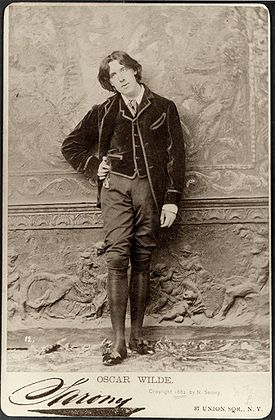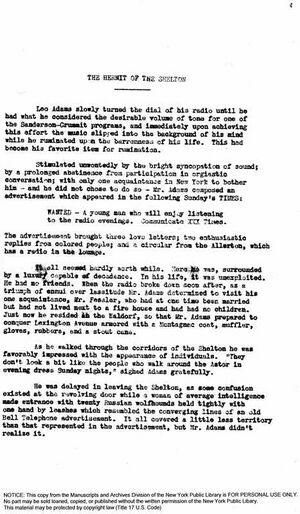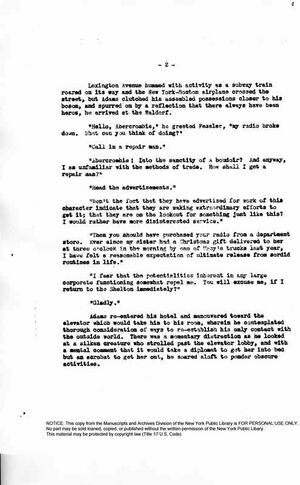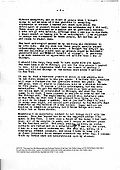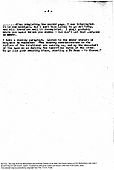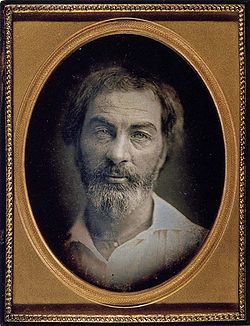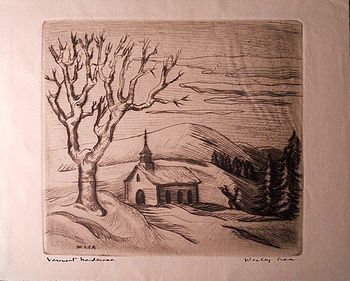Wilde, Whitman, and the Gay Literary Style
This is the fifth entry in the exhibit: Leo Adams: A Gay Life in Letters, 1928–1952
The fourth entry is: Language and Self-Representation
"His purple interludes are at once reminiscent of Oscar Wild and Frank Harris. He is not, of course as Wilde as Oscar but neither is he, on the other hand, as Frank as Harris, though if sufficiently Harrised he might go Wilde."––Merle Macbain to Leo Adams, July 12, 1930.[1]
"A little Whitman goes a long way with me."––Leo Adams to Merle Macbain, April 9, 1944
Leo Adams always believed that his letters were worth preserving, but perhaps not always for the same reasons as his friend Merle Macbain. As a young man, Adams had some minor literary ambitions and he was susceptible to the encouragements of his friend Merle Macbain––a writer, magazine editor, and amateur poet with strong literary opinions. It is clear from Macbain's first letter in the collection that Leo Adams had written to him from New York several times since arriving. But it is not until after receiving the letter from Macbain quoted below that Adams began to place carbon paper between the sheets in his typewriter and archive copies of his outgoing letters. Here is what Macbain wrote:
- I presume that you are by this time so bloated with prosperity and so well poised upon the peak of a general sense of well being that you have relegated artistic aspirations to the limbo of childish fancy and decided to confine your writing to the endorsing of checks. Your letters convince me that you could write a fairly interesting style if you tried and I suggest you try to write and sell something while you are in New York.[2]
Adams responded gratefully:
- I appreciate the correspondence which you have directed at me. I also appreciate your deliberate thrust that my letters indicate “I could write a fairly interesting style”. That jeweled thought is one of the most treasured gems in my chest of Woolworth possessions. Why, some day, I’ll bet you’ll be selling these letters for my autograph.[3]
When Adams started making carbon copies of his letters he may have been thinking that they might someday enter the historical record––whenever that history finally got written––but that's not what he said at the time. He was creating a literary corpus at least as consciously as he was preserving a historical record and his letters are as "amusing and informative" today as they were to his friends at the time. His style is certainly not "modern"; he got his poetry from the newspapers and The New Yorker rather than modernist organs like The Dial or Harriet Monroe's Poetry. His writing, with its self-conscious deployment of wit, aphorism, and irony, demonstrates the continued influence of Oscar Wilde and the European fin-de-siècle among gay men of the period in defiance of modernism's injunction to "make it new."
There is an example in a story fragment enclosed with a letter to Merle Macbain dated January 2, 1932. The story,"The Hermit of the Shelton," narrates an imaginary episode in Adams's life at the residential hotel he lived in from to 1931 to 1947. His narrator has placed a classified ad in the Times seeking "A young man who will enjoy listening to the radio evenings." His advertisement produces "three love letters; two enthusiastic replies from colored people;
and a circular from the Allerton [Adams's first address in New York], which has a radio in the lounge."[4] Inopportunely, Adams's radio breaks down and, in the following passage, Adams responds to a neighbor who has offered him advice on how to find a radio repairman:
"Won't the fact that they have advertised for work of this character indicate that they are making extraordinary efforts to get it; that they are on the lookout for something just like this? I would rather have more disinterested service."[5]
One can almost hear the imperious voice of Lady Bracknell admonishing her nephew Algernon in Adams's Wildean paradox.
A comparison of Adams's self-consciously Wildean style with that of his friend, the artist Wesley Lea, is instructive. Lea's celebration of working men in rural America and his frank sexuality are closer to the style of Walt Whitman and his celebration of the manly love of comrades than Adams's imitation of fin-de-siècle aestheticism.
- Dear Leo,
- Having been here a week, I have set up a studio, and I am ready for a steady summer of work. I shall play, too, with the boys. I never seem to get tired of them. They are a never ending source of delight, with their refreshing young personalities. We play ball, go fishing at night, and most delightful of all, wrestle by the hour after sun down.
- It suddenly occurs to me that Vermont is part of America. I have never thought of it as such before. I like to bum around with the ill reputes of the town, (male of course), and I have been listening to their talk. They have a temperament as rich and powerful in quality as a lad from Louisiana, or a guy from the far west. Aside from these flighty association[s], I have been with few people, and I enjoy the isolation. It can make the individual more self sufficient. (Wesley Lea to Leo Adams, May 27, 1938.)
- Dear Leo,
- ...But my greatest triumph, in my own mind, is that of being excepted [sic] by the men, as a man, and on their terms. It is strange that I should enjoy the esteem of halfwits and imbeciles, those local laborers who are good for nothing else but hard labor. My sense of triumph is that I am excepted [sic] by them and I am also an enthusiastic cocksucker, as you know.
- But perhaps my triumph is really that of being sought for by a handsome jack, aged 20, who is my partner, sawing and chopping and lugging heavy timbers. But I do know that my affair of his making is a stimulation divine. I promise to send you a photo of him, as soon as I have one printed. (Wesley Lea to Leo Adams, October 21, 1938.)
There is something else about Leo Adams's "fairly interesting style" that suggests that the two ways of reading his letters––the historical and the literary––are not such separate pursuits after all. His passive voice, oblique speech, euphemisms, the delaying and withholding of information, and the formality with which he addresses even his closest friends are symptomatic of a social speech pathology that has evolved into a style. It is as if Adams, acting as his own editor and archivist, has internalized the institutional codes that read his desires as perverse. Today we might diagnose this effect as "internalized homophobia." Merle Macbain could write that he had "slept with at least 300 women" and that he was "still capable of becoming fairly intoxicated with the thrill of kissing a certain virgin"––that he could imagine himself "committing rape" even.[6] Leo Adams, on the other hand, ends a letter "Be patient and some day I will tell you of my loves."[7] He never does. But there is also something liberating in his archness. His style is adaptive, and like all language, its development is social and political in nature. But while it develops within an oppressive relationship to power, the mere fact of its development is evidence of resistance to power. Gay men developed a unique language to give voice to "the love that dare not speak its name."
Back to the Main Page of this exhibit: Leo Adams: A Gay Life in Letters, 1928–1952
Notes
- ↑ Leo Adams Papers, New York Public Library. Hereafter cited by name and date only.
- ↑ Merle Macbain to Leo Adams, October 26, 1928.
- ↑ Leo Adams to Merle Macbain, December 15, 1928.
- ↑ Leo Adams to Merle Macbain, January 2, 1932.
- ↑ Leo Adams, "The Hermit of the Shelton" (unpublished), Leo Adams to Merle Macbain, January 2, 1932
- ↑ See Merle Macbain to Leo Adams, January 1932.
- ↑ Leo Adams to Merle Macbain, July 28, 1930.
